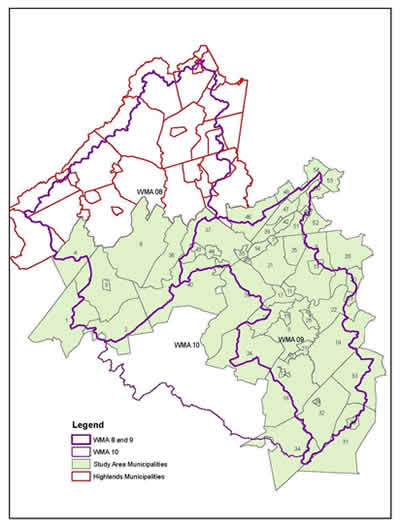Projects & Programs - Keep the Rain from the Drain
National Fish and Wildlife Foundation ~ Incorporating Green Infrastructure Resiliency in the Raritan River Basin
Background:
The Raritan River Basin is approximately 1,100 square miles in size and contains portions of seven counties and 98 municipalities. Based upon a preliminary land cover analysis of the entire basin, the basin contains approximately 140 square miles of impervious cover or 89,482 acres of impervious cover. For the New Jersey water quality design storm of 1.25 inches of rain over two-hours, approximately three billion gallons of stormwater flows across these impervious surfaces in the design storm. Assuming an annual rainfall of 44 inches, approximately 107 billion gallons of stormwater drains from these impervious surfaces per year. As our climate changes, New Jersey can expect more intense storms and more annual rainfall, which will result in more flooding and higher risk for residents and businesses within the Raritan River Basin. Better management of stormwater runoff from impervious surfaces will help municipalities in the Raritan River Basin become more resilient.
Project description:
This project will lay the foundation to reduce future flooding impacts from the impervious surfaces in the Raritan River Basin, improve water quality, enhance wildlife habitat, and increase resiliency. This project will complete impervious cover assessments and reduction action plans for 54 municipalities within the Raritan River Basin. The project will produce a guidance document for municipalities on "How-To" implement green infrastructure strategies to reduce the impact of stormwater runoff from impervious surfaces on water quality. This project will review a sampling of local ordinances and master plans to determine how to incorporate impervious cover reduction strategies into such plans and ordinances. This project also will install "climate resilient" green infrastructure practices in the Basin to reduce the water quality and flooding impact of impervious surfaces, helping to move these 54 municipalities towards climate resiliency.
This project will implement climate resilient green infrastructure practices that will treat five (5) to ten (10) acres of impervious surfaces, capturing 68 to 136 million gallons of stormwater annually. More importantly, the project will provide 54 municipalities with plans that contain projects that could treat an additional 50 acres of impervious surfaces in the Raritan River Basin. This project will empower communities to change policy and take action.
Project location:
Click here for a detailed map and tables identifying the location of the 54 municipalities within the Raritan River Basin.

In the news:
- Beautiful Garden at Governor Livingston HS Serves a Practical Purpose - TAP into Berkeley Heights, 8/11/2017
- Gov. Livingston High School New Rain Garden Works to Reduce Stormwater Flooding - TAP into Berkeley Heights, 9/7/2016
- Schools focus on technology, environment - North South Brunswick Sentinel, 9/17/2015
- Rain gardens welcome Parkview students back to school - TAP into Milltown/Spotswood, 9/1/2015
- Project plans to prevent groundwater pollution - Sentinel North South Brunswick, 12/4/2014
Project deliverables:
- Resources - Green Infrastructure Guidance Manual:
Click here to access the "Green Infrastructure Guidance Manual."
- Reports:
Impervious Cover Assessments (ICAs) and Impervious Cover Reduction Action Plans (RAPs) for each of the 54 municipalities within the Raritan River Basin:
HUNTERDON COUNTY |
|
Delaware Twp |
|
East Amwell Twp |
|
MIDDLESEX COUNTY |
|
Dunellen Boro |
|
East Brunswick Twp |
|
Edison Twp |
|
Helmetta Boro |
|
Highland Park Boro |
|
Jamesburg Boro |
|
|
|
|
|
|
|
Milltown Boro |
|
|
|
|
New Brunswick City |
|
MONMOUTH COUNTY |
|
Englishtown Boro |
Manalapan Twp |
Freehold Boro |
Marlboro Twp |
Freehold Twp |
Millstone Twp |
SOMERSET COUNTY |
|
|
|
|
|
|
|
|
|
|
|
|
|
|
|
|
UNION COUNTY
|
|
|
|
|
|
|
|
|
|
|
|
|
|
-
Installed Practices:
The following map identifies the climate resilent green infrastructure practices installed within the Raritan River Basin as part of this project.
Project funding source:
National Fish and Wildlife Foundation
Hurricane Sandy Coastal Resiliency Competitive Grants Program
